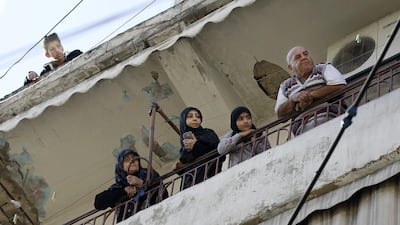BEIRUT // Not long after ISIL-claimed suicide bombings killed more than 40 people on a crowded shopping street in Beirut’s Shiite majority southern suburbs last week, there was strong criticism over the media’s use of the words “Hizbollah stronghold”.
The basic argument goes like this: Beirut’s southern suburbs are civilian neighbourhoods similar to any other and using the words “Hizbollah stronghold” at the very least dehumanises civilian casualties and at the very worst, justifies attacks.
The uproar over the use of the term “Hizbollah stronghold” coincided with anger in Lebanon that while outpourings of grief and support emerged worldwide following the ISIL attacks in Paris on November 13, Lebanon received little such sympathy despite the relatively high death toll here.
A wide range of reports on the attack, including The National's, used "Hizbollah stronghold" in relation to this bombing and past attacks.
According to its primary definition from the Merriam-Webster dictionary, a stronghold is “an area where most people have the same beliefs, values ... an area dominated by a particular group”.
Much of Beirut’s southern suburbs would easily fit that definition, but to the ears of many people, the word has overt military implications, as if describing a fortress. It is an imperfect descriptor, but gets used to convey context when there is space for only a few words.
Beirut’s southern suburbs do not resemble a fortress, but they are not exactly what one might regard as a normal neighbourhood either.
The southern suburbs, collectively referred to in Lebanon as Dahiyeh, are a crowded, highly populated area of the city, full of people who go about their lives like anybody else. This part of the city was part of what was called the Belt of Misery, a string of slums on the edges of the capital that poor Shiites moved into from the countryside during the 1960s and 1970s. Dahiyeh remains impoverished today, though the overall situation has improved since the Belt of Misery days and there are now middle class and even upper class areas.
It is clearly a civilian area. But it is also important militarily for Hizbollah. Against the backdrop of a chronically weak and dysfunctional Lebanon, this is the capital of Hizbollah’s state within a state – or depending on who you ask, their state within a non-state – and the group treats it as such, using its militia to maintain control.
Passing through, Dahiyeh looks just like any other neighbourhood save perhaps for the martyr posters of Hizbollah men killed in Syria, the blast walls that sit in front of some buildings and the Lebanese army checkpoints at every entrance. Lingering too long as an outsider or snapping a picture quickly risks detention.
When incidents like last week’s bombings occur, Hizbollah’s forces are quickly seen on the streets. Its fighters deploy, conduct security patrols and establish checkpoints. If Lebanese army troops are on the scene, it is clear they are not the ones calling the shots.
Hizbollah’s fighters are also not brought in from some distant barracks. They are here, all the time, living in these neighbourhoods. Most are from these neighbourhoods. And they and their organisation receive widespread support from many of the civilians living here. The bombings, the wars, the Israeli aerial bombardments on this area all brought on by Hizbollah’s actions over the years have done little to diminish public support.
Distinguishing between Hizbollah’s forces and the civilian in Beirut’s southern suburbs is nearly impossible. Hizbollah makes use of civilian residential buildings to house its offices and command centres. There are no signs marking them and they are not distinguished from other buildings.
All of that said, when ISIL suicide bombers struck the neighbourhood of Burj Al Barajneh on November 12, they were not targeting Hizbollah’s military or political apparatus. While Hizbollah does place its offices in civilian areas, knowing where they were and actually getting inside would be a huge coup for ISIL. Not to mention the bombers set off their explosives on the street.
In Lebanon’s delicate sectarian and political patchwork, the location of bombings is almost always significant, except perhaps in some assassinations where the place can just be the best spot to kill the target.
In ISIL’s statement claiming the attack, they said the suicide bombers struck Hizbollah. But in reality its bombers wanted to kill civilians. Not just any civilians. They wanted to kill Shiites – and hopefully Shiites who supported Hizbollah – in a part of the city where the group provides security. They wanted to kill Shiites whose sons, fathers and brothers might be fighters in Syria. They wanted to provoke a reaction, a retaliation, to incite fighting in Lebanon, to harden sectarian lines and strife here.
Retaliation has not come, at least not yet. But in the aftermath of the bombing, some of those gathered at the bomb sites started pointing their fingers at the Sunni-majority Palestinian camp just a few minutes’ walk away. Nearby others shouted “we are at your service O Nasrallah! We are at your service O Hizbollah!”
foreign.desk@thenational.ae

